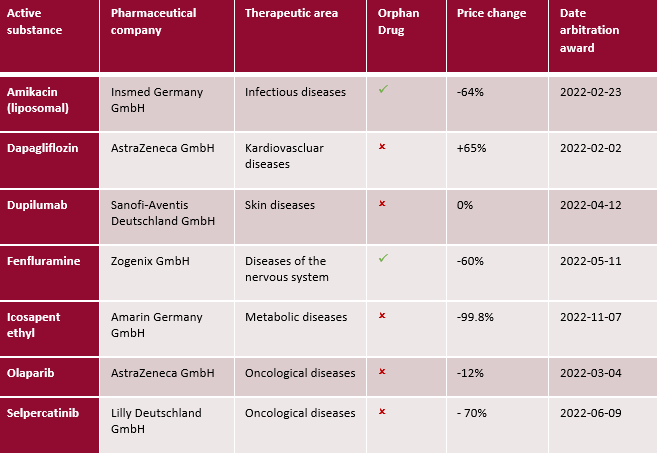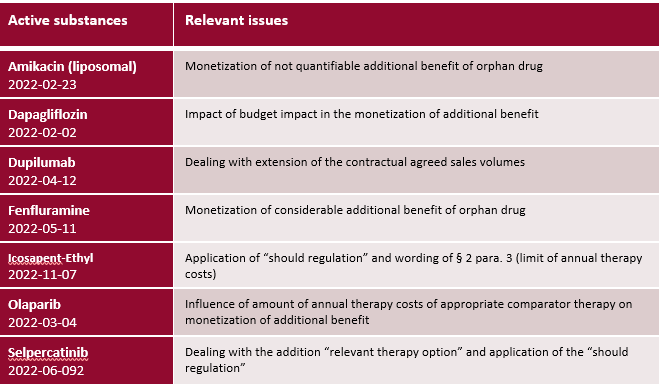A case that is sometimes not avoidable: The negotiation parties PC (pharmaceutical company) and the GKV-SV (National Association of Statutory Health Insurance Funds) cannot decide on the reimbursement amount for a pharmaceutical and/or on further contract components.
The AMNOG process regularly defines that the period of price negotiation starts after the benefit assessment. During this time, it is the responsibility of the PC and the GKV-SV to commonly agree on the reimbursement amount for the pharmaceutical. This should happen according to § 130b para. 9 SGB V within four negotiation meetings and six months. However, sometimes at the end of this period, the two parties are still (far) apart in their ideas about the appropriate reimbursement amount or individual contract components. The reasons for this can be manifold. However, it is usually the reimbursement amount that remains in dispute between the two parties. If this is the case, Section 130b (4) of the German Social Code, Book V stipulates that the Arbitration Board must be called, and the three-month process of arbitration begins.
How does the arbitration proceed formally?
After the start of the arbitration proceedings, both parties prepare the so-called “concretizing request”. This contains a statement of all rationales and arguments that are to contribute to the resolution of the issues in dispute. The Arbitration Board determines a deadline for the submission of the concretizing applications. Additionally, the Arbitration Board sets the date for the oral hearing. This date is the actual date of the Arbitration Board. Here, both parties have the opportunity to present all arguments and discuss counterarguments during a plenary session. Moreover, the Arbitration Board can clarify open questions concerning the rationales of both parties. After that, the Arbitration Board comes together, consisting of three impartial members, two representatives of the PC, and two representatives of the GKV-SV. They decide on the outcome of the matter in dispute and write the so-called arbitration award.
The arbitration award presents the derivation and argumentation of the Arbitration Board as well as the final decision on the issues that were in dispute. During the price negotiation period, everything is confidential, but the arbitration award is publicly available. It can be received by the administrative office of the Arbitration Board.
Prof. Dr. Stefan Huster has been the impartial chairman of the Arbitration Board since July 2019. Since the beginning of the AMNOG, there have been 62 arbitration awards, seven of which were decided in 2022. However, this does not mean that only 62 arbitration processes have been conducted. The Arbitration Board endeavors to ensure that both parties exchange views again in the phase of drafting the concretizing application, but at the latest during the oral hearing, in order to agree on further aspects and, at best, to reach a final agreement. According to experience, this succeeds more often than average. It is often advantageous for both parties to reach an agreement in this way. In this way, they do not relinquish decision-making power to a third party and can influence the outcome more strongly. In addition, the arguments and discussions of both parties remain confidential.
In return, the arbitration awards publication is often directive for future price negotiations and arbitration processes. The content and the arguments and rationales of the Arbitration Board are analyzed to receive hints about future decisions by the Arbitration Board. These findings can be used in future price negotiations by the PC and GKV-SV to validate the plausibility of their rationales and predict the decision by the Arbitration Board.
What were the topics of the Arbitration Board in 2022?
Various therapeutic areas were covered by the Arbitration Board in the past year (see table 1).

Table 1: Arbitration awards from 2022 (as of 05.01.2023)
Two of these proceedings involved orphan drugs. The reimbursement amount was in dispute in all arbitration processes. The Arbitration Board decided in a single case on a price increase of 65%, in one case for no price change, and in the other processes up to a rebate of 99.8%. All of this year’s Arbitration Board decisions highlighted interesting aspects that could be relevant for future arbitration awards, but also for price negotiations (see Table 2).

Table 2: Relevant issues of the arbitration awards in 2022 (state: 2023-01-05)
SmartStep analyzes all published arbitration awards based on various factors. This knowledge is used for the preparation and support of price negotiations. Additionally, based on this, possible scenarios for the decision of the Arbitration Board can be created.
Moreover, SmartStep supports PC in the arbitration process. The support can range from critical commenting of the draft of the concretizing application, the preparation of the strategy for the arbitration process to the attendance and support in the oral hearing.
Do you have any questions?
Simply contact us by e-mail and we will be happy to advise you.
